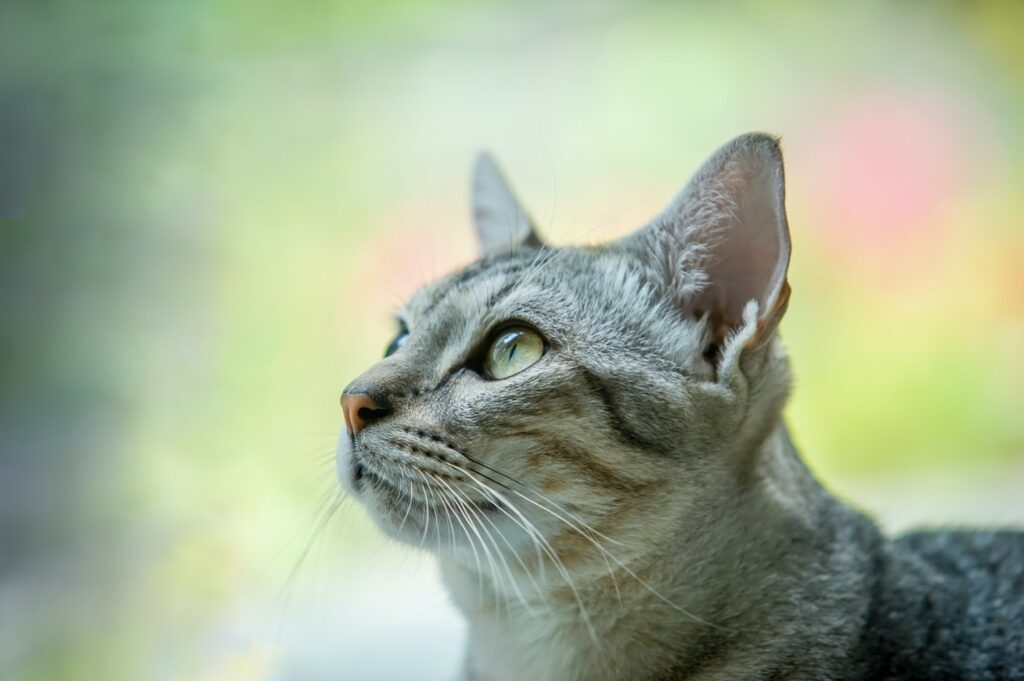You want to know “Why is my cat so clingy?” Good question. The truth is that there isn’t just one answer. Possibilities range from unmet basic needs to the fact that a domestic kitty is always trying to communicate with you one way or another. Or you may just have a very adoring feline friend!
But wait — there’s more! Did you know that cats experience hourly, daily, and weekly cycles unique to the species and even more unique to individual cats? For example, some prefer companionship and cuddles at night, some in the morning, some all the time, and some none of the time. Some don’t want to be touched after they groom or clean. These patterns might change, too. Don’t ever take it personally, but instead learn to accept it as part of their feline ways. They love you regardless.
Cats are individuals but their behaviors become easier to interpret when you understand their needs, communication, and emotions. We’re here to help. There’s a glossary near the end of this post to clarify words in bold.
What Does “Clingy” Mean?
“Why is my cat so clingy?” you ask. We can’t talk about solutions until we explain the term. It’s a very subjective word, too often expressing a feeling of annoyance that your feline is a pest or even a “scaredy-cat.” Put yourself in your cat’s paws, though. Domesticated cats depend on our caring. Provided their most important needs are met, cats feeling close to you and trusting you is beautiful! They express the beautiful relationship they share with their person by being nearby. And what a comfort!
We can redefine clinginess to possibly include some other meanings:
- Adoring
- Affectionate
- Attached
- Needing something
- Bonded
- Cuddlesome
- Devoted
- Doting, fond
- Lonely, feeling deserted
- Smitten, overcome with attraction
Have you ever felt clingy? Do you think all humans have been clingy at some time in their lives? What were some causes? Can you tell the difference between an individual’s natural personality versus a change in personality?
If your pet wanting to be close to you is annoying, remember to examine your own issues. You might be reacting to memories of a person in your past who was possessive or overly controlling. Just as your cat has been affected by experiences of being hurt by humans, you can be as well.
Why Is My Cat So Needy?
The answer to the question is in the question. Your cat is so needy because your cat needs something. Your job is to be a detective like Sherlock Holmes and follow the clues to find out what your kitty needs. No worries, though, that’s where we come in — our job is doing most of the research for you.
Here’s a simplified list of your cat’s basic needs. Based on psychologist Dr. Abraham Maslow’s studies, it’s pretty much what all sentient beings need:
- Physiological needs: Air, water, food, shelter, and sleep
- Safety: Personal health, stability, and a suitable territory providing access for hunting and self-care
- Connection: Bonding with family, tribe, colony, pack, or society
- Esteem and freedom: Confidence, opportunities to learn and practice new skills to adapt to new situations
- Self-actualization: Expressing one’s true self, doing what is natural for to feline species: hunting, playing, solving problems, experiencing psychological, emotional, and physical stimulation
One of the absolute best things you can do for your kitty is to create a catio. It’s a dream hideaway designed just for cats to meet all their needs. Although it’s enclosed, it gives them the freedom to smell and watch the Great Outdoors while surrounded by live plants and fresh air. It has space to exercise as well as spots to climb, perch, hide, scratch, and take care of business in peace and safety.
A few cardboard boxes wouldn’t hurt, either. Read our Happy Tails post to learn all about catios. You’ll no longer be asking, “Why is my cat being so clingy?” because you’ll have created Heaven on Earth for sure!
Why Is My Cat Being So Clingy and Vocal
In wondering, “Why is my cat so clingy?” you might have figured out by now that your cat either has a problem or is fine except for missing your company! Felines are pretty clear about communicating what they want if you speak the language. They’re usually much more vocal with humans than each other, so their commentaries are specifically directed to you regarding a concern with their wellbeing. As you know, some kitties are more vocal than others so even if he or she just wants some cuddle time, you’re going to know.
Cat Communication
Among themselves, cats use several methods of communication. Because their sense of smell is so powerful, they have numerous scent glands all over their bodies to mark territory as well as each other. When cats rub against you, they’re marking you as part of their family.
Cats also use tactile methods such as rubbing to get your attention since humans can’t respond to scent messages. Humans are more familiar with vocal communication and body language. As with any language, the more you learn and practice, the better you’ll be at “conversing.”
How Do Cats Think?
Felines have been around for tens of millions of years. They developed bodies and skills to become successful predators. Around 10,000 years ago these usually solitary hunters discovered that humans growing wheat and other grasses attracted rodents. Easy meals! It was a natural partnership because humans enjoyed the cats’ beauty, playfulness, and affection. Feline thinking is based on survival involving a combination of physical and mental skills.
Domestic cats have thrived with humans when they can freely live their feline lives:
- Safe exposure to the outdoors including plants and other animals
- Exploration and use all of their senses
- Territory in which to exercise, climb, scratch, hide, and play
- Mental stimulation and enrichment
- Companionship, socialization, and affection — although predators themselves, domestic cats are small enough to be prey for larger animals including hawks, coyotes, dogs, and black vultures
Our Happy Tails post explains more about feline mental processes.
What Do Cats Feel?
Emotions are woven into physical and mental health. Cats can feel lonely from separation anxiety, but also from a history of isolation or being removed from their mothers earlier than 12-14 weeks. When overindulged by humans, cats become accustomed to certain routines: they aren’t “spoiled” but suffer from unrealistic expectations. Cats can definitely feel bored and frustrated, but again, that’s a result of confinement by humans depriving them of mental and physical stimulation.
Insecurity and fear result from disruptive, unstable situations. On it goes. “Why is my cat so clingy?” So-called clingy behaviors are often feline attempts to communicate their feelings to their humans. Cats are compassionately aware of orphaned infants of all species and human feelings as well as health conditions, often demonstrating concern. People close to animals fully believe that felines are capable of gratitude and great love.
Why Is My Cat So Clingy after the Vet?
Poor humans have little understanding of animals’ sense of smell! Most animals perceive a world of which we have limited awareness. If you had an olfactory ability like that of a bear or a bloodhound, what would you detect at the vet’s office? Fear, terror, illness, blood, pus, dying, and death.
Experience has taught them that there’s good reason to be petrified of going into noisy facilities where busy strangers with metal and chemicals do incomprehensible things. They’re afraid of being deserted. Asking “Why is my cat so clingy?” might lead to answers about a painful past.
Many cat people prefer holistic veterinary practices where the treatments address the entire patient — species-specific needs, mental and emotional needs as well as social factors — rather than just the medical symptoms. The American Holistic Veterinary Medical Association offers an ever-growing directory of doctors who can help explore and explain feline behavioral questions.
Are Cats Really Independent?
Yes and no. As we’ve discussed, domestic cats have integrated with humans for a long time for each species’ mutual benefit. Each relationship is different. When animals are elderly or compromised in any way, it’s not unusual for them to depend on their people in ways they never needed to during their youth. This is one reason why a predictable daily routine is so important. When cats develop strong bonds, it’s natural to communicate their emotions including their affection for their human companions.
Feline Insecurity And Vital Nutrition
Now is a good time to discuss ‘real’ nutrition. The phrase “food insecurity” is one of the buzzwords of the past few years. It refers not only to lack of food but also to lack of proper food. To make a profit, too many pet food manufacturers cut corners by adding cheap filler ingredients such as unidentified meat by-products, overprocessed grains, chemical dyes, and preservatives. The cooking process that dries kibble also deactivates vital nutrients and eliminates the moisture content. In nature, felines get most of their water from fresh meat.
A homemade fresh raw diet or a pre-made freeze dried or frozen raw diet contains loads of Taurine, a calming amino acid required by felines for a calm nervous system. Taurine is also required many physiological processes of the feline chemistry and metabolism.
Cats often feel insecure because they are food insecure or in other words not getting vital ingredients. They do best with a variety of unprocessed foods that include clean organ meats and small, soft, raw bones. Read about the BARF-type diets made especially for felines’ needs. BARF is the acronym for Biologically Appropriate Raw Food, a formulation of balanced nutrient-dense foods.
When animals, including human animals, have a regular diet of healthful foods and plenty of chemical-free water, amazing things happen. With all the necessary building blocks for health and with good hydration, critters feel calmer and more confident.
“Why is my cat so clingy?” Maybe your cat is just HANGRY for good quality food! Truly, you’d be amazed at the change in your cat’s temperament with this single most important requirement.
Why Is My Cat So Clingy at Night?
Because cats are usually AWAKE at night and you’re not! They’re crepuscular, meaning that for thousands of years they’ve done most of their hunting at dawn and dusk when prey is out and about. Your cat is your buddy and wants to hang with you, and after sleeping all day, the best time is the night time!
Cat can also adapt to regular household routines as well though, such as your hibernating hours. They can often will sleep the whole night through with you, on your bed, or curled up in the nook of your legs. Sometimes under the covers.
How Are Cats and People Alike?
Cats are like people in that they each have individual personalities. They show their affection differently — think of some of the people you’re close to. How readily do they express difficult emotions? Do they use body language more than spoken words? Do they like to spend time with you but not interact much?
Have you noticed some people being pretty solitary but still maintaining a connection? Are some emotionally unpredictable? You don’t want to anthropomorphize by treating your cat like a furry little human, but we do share sentience.
Why Is My Cat So Attached to Me Lately?
Think about what’s changed in your kitty’s life recently. Change is scary for most of us so we appreciate emotional support from friends we trust. Remember all the times you felt disoriented by changes in your life: your parents moved the furniture around. You got fired from your job. Your dog had puppies. A hurricane hit that was worse than expected. You lost a tooth. Your cat is no different from you in that way and needs your support.
Assessing Clinginess: A CHECKLIST
This is a general tool to use regularly for your cat’s wellbeing:
□ INVESTIGATION: Have your cat’s usual behaviors changed? What has changed in the daily routine?
□ HEALTH: Check your cat head to toe (ears, eyes, teeth, skin and fur, paws, genital area, tail) for swelling, wounds, discharge, tender spots, abnormal coloration, abnormal sounds such as wheezing, abnormal odors, etc. Observe for changes in eating, drinking, and activity; when possible, check bowel movements and urine for changes. Consult your kitty’s vet if it’s been a while.
□ NUTRITION and HYDRATION: Offer ample fresh water and clean, high-quality nutritious food.
□ SAFETY: Provide a space that’s safe, sanitary, predictable, and quiet. It should furnish hidey-holes, spots for napping, and several clean cat boxes containing chemical-free litter.
□ MENTAL and EMOTIONAL FULFILLMENT: Ensure that your feline’s psychological needs are met by exposure to different kinds of sights, smells, sounds, activities, and experiences. Cats trust you for socialization with friends (of any species), shared time to give and receive affection, and an environment without fear.
□ EXERCISE: Provide daily opportunities to play, exercise, hunt, explore, scratch, climb, and use all the senses.
□ ROUTINE: Create a generally predictable schedule to prevent disruption by unnecessary changes.
□ ACCEPTANCE OF INDIVIDUALITY: Remember that the cat with whom you share your life may simply love your warmth, attention, and close proximity.
KEY TAKEAWAYS
- Observe life from a cat’s point of view.
- Make time to learn about their language and needs.
- Cats love routines, so try to keep life predictable by scheduling playtime and cuddle times.
- Stay calm, don’t yell, and avoid loud, sudden noises.
- Introduce new things slowly. Offer extra reassurance when changes in the household take place (moving, loss, death, a new family member, weather drama, illness, etc.)
- Provide appropriate shelter, easy access to food and water, clean litter boxes, comfy places to hide, scratching areas, and toys.
- Cats need outside in one way or another. A CATIO is best when possible, but even an indoor sort of garden catio will make a difference with a window. Felines crave smelling outside air. Go on supervised outings with a halter and leash if your kitty isn’t afraid.
Final Thoughts
When asking, “Why is my cat so clingy?” did it ever occur to you that your kitty is concerned about you? It’s well documented that cats tune in to human emotions and frequently respond to our sadness and anxiety. Pregnant women have reported their feline friend’s interest in the growing baby. Cats are incredibly sensitive beings. If they think you’re not getting the message, they’ll keep trying to tell you! They might want your help, or maybe it’s just as the Carpenters sang, “They long to be close to you …”
Glossary
Anthropomorphize: Treating animals as if they had a human mentality and behaviors instead of recognizing each species’ similarities with and differences from humans
Buzzword: A phrase or word emerging suddenly into popular use
Catio: “Cat” + “patio” — an enclosed feline heaven you create with spots to climb, hide, nap, and do other cat things
Crepuscular: Most active at dawn and dusk, resting during daylight and nighttime hours
Hangry: “Hungry” + “angry” — crabby, needy, clingy, frustrated due to craving nutrition
Holistic: Focusing on the entire individual’s mental, emotional, and social needs as well as species-specific needs rather than a single isolated aspect; often used to indicate medical care that integrates western practices as well as ancient traditional practices and experimental methods all according to the needs of the individual patient’s desiresPhysiological: Relating to physical needs and functions
Self-actualization: Confident in expressing one’s individual self and personality
Sentient: Having conscious awareness of self and changes in one’s environment
Subjective: Interpreted by a person’s personal feelings and opinions without considering other causes; seeing only through the lens of one’s own experiences
Tactile: Relating to the sense of touch, meaning pressure, temperature, vibration, etc.
Resources
Meowslow‘s Hierarchy of Needs
https://www.catsonbroadwayhospital.com/happy-healthy-cat-meowslows-hierarchy-needs/








